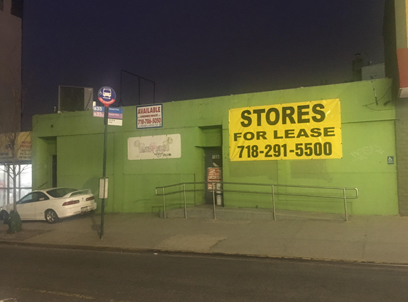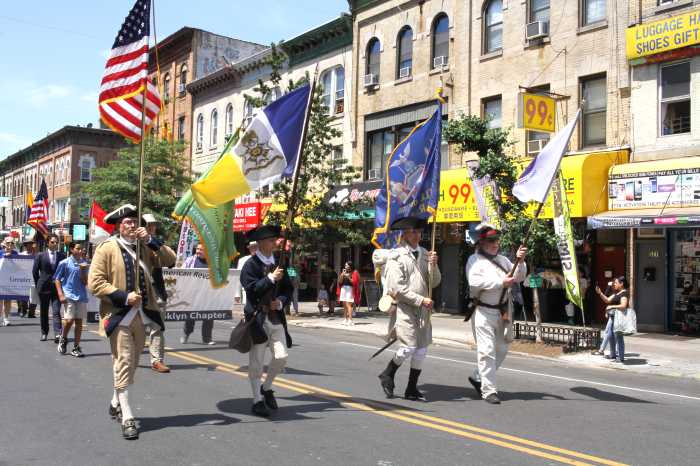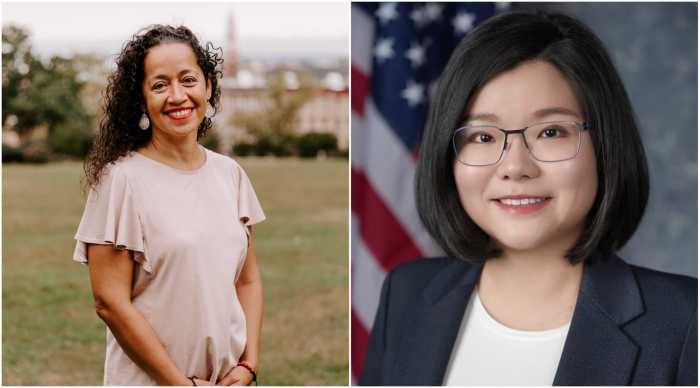It’s like déjà vu all over again!
The owner of a soon-to-open 39th Street bar that neighbors worry will cause the same quality-of-life problems as its seedy predecessor must return to the Sunset Park community board — again — to present a written security plan for the space after he failed to bring it to this month’s Public Safety Committee meeting, which he agreed to do back in April, according to board officials.
“The residents deserve to know, what are we going to do to mitigate some of the nuisances?” board chairman Cesar Zuniga said at the June 7 meeting. “I think the expectation was that you guys were going to bring that plan here tonight.”
The bar’s owner and manager, Pablo Nivicela, appeared before the committee with a lawyer and a security specialist, Tony Caldarola, who’s also a retired city police officer. The duo promised that Explosion 21 — the forthcoming “upscale” spot between Third and Fourth avenues — would avoid repeating predecessor El Tropicoso’s two years of troubled history at the site, which included 62 Criminal Court summonses for excessive noise, public urination, and drinking in public; 44 calls to 911; and a sex crime.
Caldarola discussed measures he would institute to control the crowd in and around the space, adding that guards at Explosion 21 would verify the identities of patrons before allowing them inside, keep a do-not-enter list, and cut people off from entering after a certain time.
“With a location like this, it comes down to controlling the crowd, controlling the music. All of our guards know, once they’re outside, you gotta get them off the block,” said Caldarola, a partner in local security company Illuminus Investigative Services.
But the committee chairman said the informal conversation about prospective security measures wasn’t good enough, because the owner was supposed to show up at the meeting with a detailed plan in writing to share with the residents.
“They were supposed to come back with a security plan,” Samuel Sierra. “That was the ask.”
Nivicela first appeared before the committee — and a seething pack of the block’s fed-up residents — with his accountant, Renan Mazorra, on April 9, when Sierra first asked the pair to return with a written security plan. But at the June meeting, Nivicela’s attorney Caldarola said that Mazorra was unqualified to represent his client in agreeing to that request because he was not a lawyer.
At the April meeting, residents also demanded Nivicela take measures to discourage debauchery, such as adding windows, closing earlier, soundproofing the space, and changing the bar’s incendiary name, which residents fear would attract a rowdy crowd. At the June meeting, Caldarola said Nivicela was open to changing the name and that they had already explored ways to soundproof the space and add windows.
But Caldarola said the bar can’t keep its previous promise to play “soft, ’80s background music” to discourage dancing, because doing so could adversely affect business.
“It’s unlikely and untenable that anyone is going to be able to restrict prospective customers from dancing,” he said. “Obviously the desire of the bar owner is to get in a nice crowd to make a nice living. If you say, ‘you can’t dance,’ this is going to frustrate his attempt to make a living.”
The lawyer added that he would host a meeting between locals and bar reps at his neighborhood office to discuss the plans, and that residents could even tour the bar to see the structural changes management would make to soundproof it.
But Zuniga drove home the necessity of putting a plan in writing that includes a timeline in order to hold the business owner accountable to locals.
“It’s one thing to talk about these things, the other is to implement them and actually see if there’s a qualitative difference in how the neighbors are receiving these changes,” he said.
The meeting with the community board was a customary, non-binding courtesy as part of the process to obtain a liquor license, which the State Liquor Authority ultimately grants or denies.

























